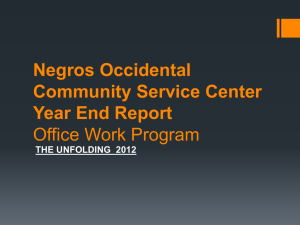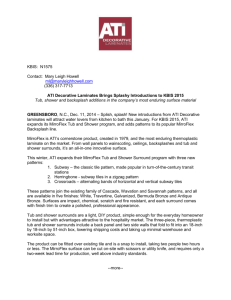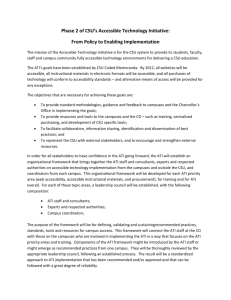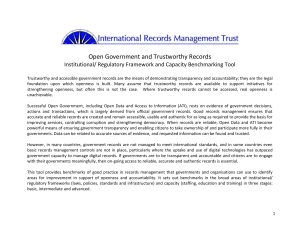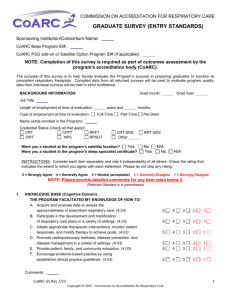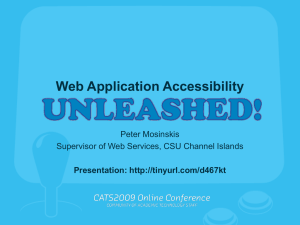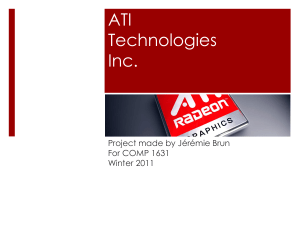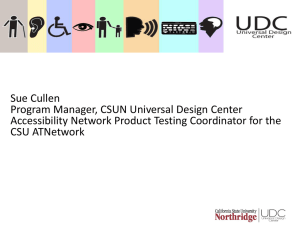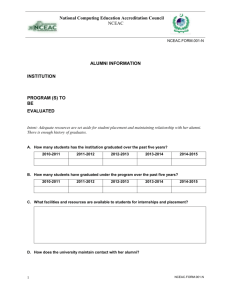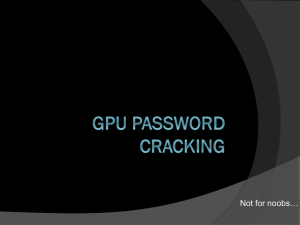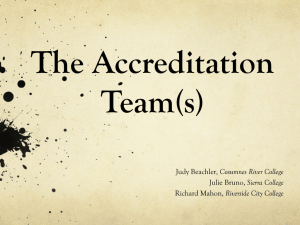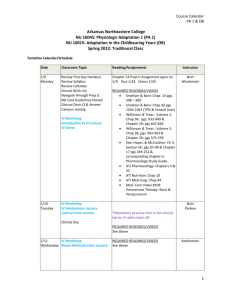To: Bryon Harris, WFAA-TV From: Carli Strength and Sue Edwards
advertisement
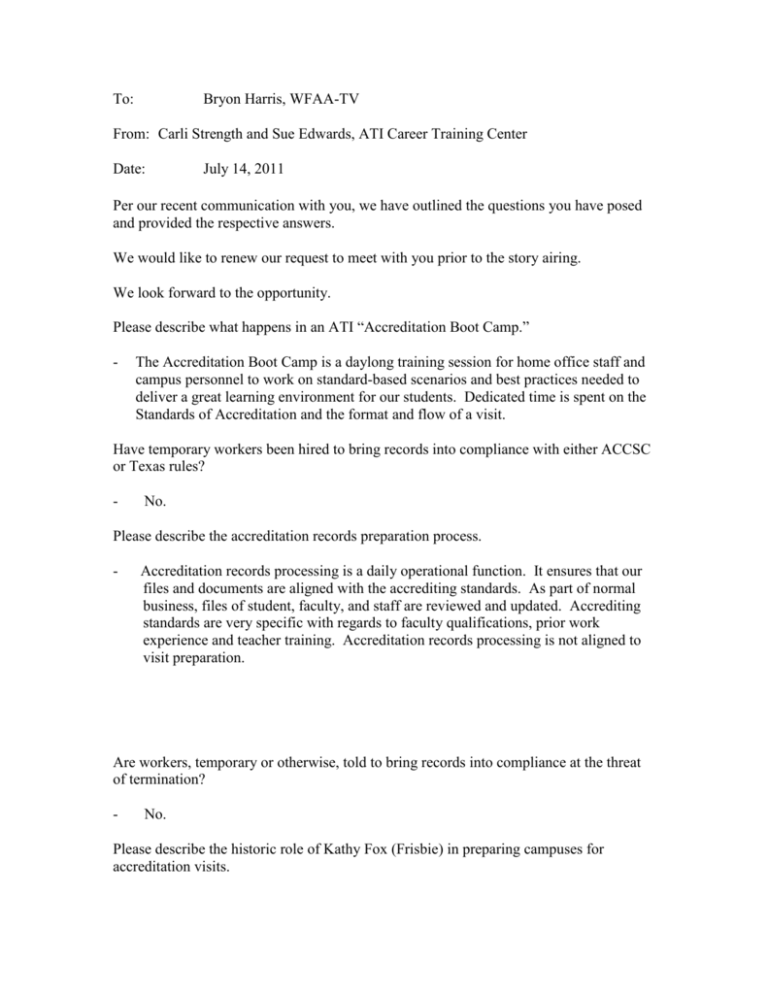
To: Bryon Harris, WFAA-TV From: Carli Strength and Sue Edwards, ATI Career Training Center Date: July 14, 2011 Per our recent communication with you, we have outlined the questions you have posed and provided the respective answers. We would like to renew our request to meet with you prior to the story airing. We look forward to the opportunity. Please describe what happens in an ATI “Accreditation Boot Camp.” - The Accreditation Boot Camp is a daylong training session for home office staff and campus personnel to work on standard-based scenarios and best practices needed to deliver a great learning environment for our students. Dedicated time is spent on the Standards of Accreditation and the format and flow of a visit. Have temporary workers been hired to bring records into compliance with either ACCSC or Texas rules? - No. Please describe the accreditation records preparation process. - Accreditation records processing is a daily operational function. It ensures that our files and documents are aligned with the accrediting standards. As part of normal business, files of student, faculty, and staff are reviewed and updated. Accrediting standards are very specific with regards to faculty qualifications, prior work experience and teacher training. Accreditation records processing is not aligned to visit preparation. Are workers, temporary or otherwise, told to bring records into compliance at the threat of termination? - No. Please describe the historic role of Kathy Fox (Frisbie) in preparing campuses for accreditation visits. - As the Vice President of Education and Accreditation, Kathy Fox was responsible for the overall educational experience of our students and the training and implementation of accrediting standards. This was an on-going responsibility that spanned each school cycle of accreditation. Ms. Fox ensured that her team partnered with campus personnel to train, coach, audit, and remediate issues. What is her title at ATI? Has it changed this year? - Ms. Fox is now the Chief Academic Officer. Her current focus is launching employee development initiatives. She continues to oversee the Education Department for ATI schools and colleges. Was Campus 50 in danger of losing its accreditation in 2008 due to the failure of its respiratory therapy students to pass their exams? - No. Campus 50 holds Initial Accreditation status with the Commission of Respiratory Care (CoARC). The benchmark set by CoARC is a three-year pass rate of 80%. Campus 50 exceeded that benchmark in 2008 and every year since. No communication was received from CoARC or any other agency that accreditation was at risk of being rescinded. How often does ATI provide special tutoring to students to assist them in passing professional exams, such as the Certified Respiratory Therapist test? - ATI provides continuous support for graduates such as Respiratory Therapy graduates in preparation for the CRT exam. This is a service provided at no additional cost to all respiratory therapist graduates. In 2008, ATI housed and fed respiratory therapy students in the Sterling Hotel in Dallas for special tutoring to pass their CRT exams. Why was this done? - In 2008 ATI held tutoring and test preparation classes for its Respiratory Therapy graduates at a local hotel. Students were not housed. This location was chosen as a central location for graduates to allow for easy and convenient access. These sessions can run an entire day. The hotel setting allowed ATI to provide graduates with a professional setting and meals while not disrupting regular classes at the school. How much did ATI pay the Campus 50 students to be tutored? We do reimburse students, on an as needed basis, for transportation and gas expenses while attending tutoring and test preparation seminars. Some students were offered $1500 as a reward for passing the exams. Were those funds taxpayer money? - Students were rewarded for passing the exam. There is no prohibition against it. No, those funds were not taxpayer money. Several students took the exam more than once. They were transported to cities outside of Dallas to take their respiratory exams. Why? - The CRT exam is a difficult exam. It is a licensing exam for health care professionals. Not all students pass this exam on the first attempt. ATI wants its graduates to pass this exam as soon as possible after graduation to allow for employment in their field. ATI has no control over the number of testing facilities for the CRT examination. As a result, there have been occasions when the local testing facilities have been booked. As a service to our graduates who may not want to wait for an opening at a testing facility we have arranged for them to take the test outside of the D/FW area. In many cases, we have provided them with transportation to the exam. Please describe the role of employment verification in accreditation. - Standards require that records of initial placement be verified. This can be completed at the campus/corporate levels of a company. Specific guidelines for placement standards were promulgated on January 3, 2011. They can be found on the ACCSC website. ABHES and COE have their own standards about records of initial employment. How often have ATI campuses been threatened with loss of accreditation because of low employment numbers among graduates? - Never How many ATI Medical Assistant graduates from Campus 57 have been placed at Allied Home Health in Dallas? - Campus 57 does not place graduates at Allied Home in Dallas. Through ATI’s 3layer employment verification process, we have determined they do not qualify as verifiable employers. ATI has established multiple checkpoints prior to counting a student as a placement. 1. The campus initially performs placement verification. 2. A separate Home Office Verification Team conducts an additional placement verification. It is important to note the Home Office Verification Team reports up to the Chief Compliance Officer and is independent from the campuses. 3. ATI also contracts with outside vendors to spot check placements. Please describe the roles of Kathy Fox Frisbie and Michael Ackerman as volunteers for ACCSC. How long did these roles last? Was either ever employed by ACCSC? - The "peer review" process established by ACCSC seeks industry-professionals to act as Team Leaders or Education Specialists. Mr. Ackerman and Ms. Fox have participated in a number of visits for ACCSC as Team Leaders. A visit traditionally lasts 1-2 days and at that point, the Team Leader's function ends. A Commission Representative is responsible for writing the Team Summary Report and delivering that report to the campus. - Mr. Ackerman and Ms. Fox have been active participants in the peer review process for a number of years. - Neither Mr. Ackerman or Ms. Fox have been employed by ACCSC What is Ackerman’s current title? - District Director of Operations Since the predominant source of ATI’s income is U.S. taxpayer loans and grants, the following questions relate to ATI’s relationship with Public Strategies. Are taxpayer’s funds being used to pay Public Strategies? - ATI is a private institution and will not comment on its operational expenses When was Public Strategies engaged by ATI? - ATI is a private institution and will not comment on its business relationships Did Public Strategies solicit ATI’s business or vice versa? - ATI is a private institution and will not comment on its business relationships What is Public Strategies charging for its services? - ATI is a private institution and will not comment on its operational expenses
